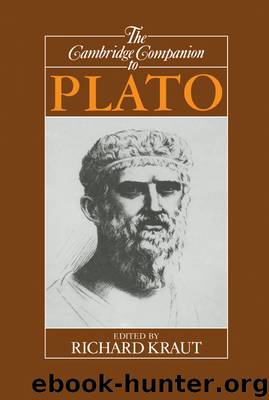The Cambridge Companion to Plato by Richard Kraut

Author:Richard Kraut
Language: eng
Format: epub
Publisher: Cambridge University Press
Published: 1992-11-21T16:00:00+00:00
NICHOLAS P. WHITE
9 Plato’s metaphysical epistemology
I
For some time philosophers have thought of epistemology and metaphysics as different branches of philosophy, investigating, respectively, what can be known and the basic properties and nature of what there is. It is hard, though, to see any genuine boundary here. The issues irresistibly overlap. Certainly in Plato there is no such divide. His views about what there is are largely controlled by ideas about how knowledge can be accounted for, and his thinking about what knowledge is takes its character from convictions about what there is that is knowable. As a result his doctrines have a different shape from characteristically modern ones.
Some earlier Platonic writings do have a somewhat modern look. Socrates was notorious for having questioned whether he knew much of anything, and for making people hesitant about their opinions (Meno 80c, 86b–c). Plato exploits this side of Socratic thought. The namesake of the Euthyphro judges that an action of his is pious. Socrates wonders whether Euthyphro ought to be confident about that judgment, and tries to make him less so. Elsewhere Socrates raises questions concerning his own judgments about which things are beautiful (H. Ma. 286c). Such questions seem to suggest a general policy of doubting, reminiscent to us of Descartes or of the various programs of ancient skepticism. In Socrates’ efforts to overcome ignorance (Meno 86b–c) we might see a project of justifying beliefs like that of typical contemporary epistemologists.
Plato’s thinking, though, moves in a different direction, and starts from a different place, too. Questions concerning Euthyphro’s judgments about what is pious and Socrates’ judgments about what is beautiful arise from a very specific source, different from the sources of skepticism in its ancient and modern forms. It is emphasized that Euthyphro’s judgment – that it is pious for him to prosecute his father for murder – is shocking to most people. But Plato does not infer simply that Euthyphro’s capacities to judge such matters are fallible. He focuses on a particular question: whether Euthyphro knows what piety is. The unspoken suggestion is that the dispute between Euthyphro and his critics is due simply to a disagreement on that question, and that an incapacity correctly to resolve the disagreement must be due to a failure to answer the question rightly. At any rate Plato immediately turns to trying to solve the problem by giving a definition of piety.
A modern epistemologist would be concerned with the basis of our concept of piety, but he would also be worried about other sources of uncertainty and disagreement over which actions are pious. If he thought that piety was an objective property, as Plato evidently does (Euphr. 10d–11b), he might well think that even if we were all sure of what it was, we might still, through deficiencies in our powers of cognition, make mistakes and disagree about which things possess it. When Descartes doubted whether he was sitting by the fire, he did not focus on the question whether he understood what a fire was or what it was to sit by one.
Download
This site does not store any files on its server. We only index and link to content provided by other sites. Please contact the content providers to delete copyright contents if any and email us, we'll remove relevant links or contents immediately.
The remains of the day by Kazuo Ishiguro(8962)
Tools of Titans by Timothy Ferriss(8359)
Giovanni's Room by James Baldwin(7313)
The Black Swan by Nassim Nicholas Taleb(7097)
Inner Engineering: A Yogi's Guide to Joy by Sadhguru(6782)
The Way of Zen by Alan W. Watts(6589)
Asking the Right Questions: A Guide to Critical Thinking by M. Neil Browne & Stuart M. Keeley(5751)
The Power of Now: A Guide to Spiritual Enlightenment by Eckhart Tolle(5741)
The Six Wives Of Henry VIII (WOMEN IN HISTORY) by Fraser Antonia(5493)
Astrophysics for People in a Hurry by Neil DeGrasse Tyson(5172)
Housekeeping by Marilynne Robinson(4433)
12 Rules for Life by Jordan B. Peterson(4298)
Double Down (Diary of a Wimpy Kid Book 11) by Jeff Kinney(4257)
The Ethical Slut by Janet W. Hardy(4235)
Skin in the Game by Nassim Nicholas Taleb(4232)
Ikigai by Héctor García & Francesc Miralles(4229)
The Art of Happiness by The Dalai Lama(4118)
Skin in the Game: Hidden Asymmetries in Daily Life by Nassim Nicholas Taleb(3986)
Walking by Henry David Thoreau(3948)
